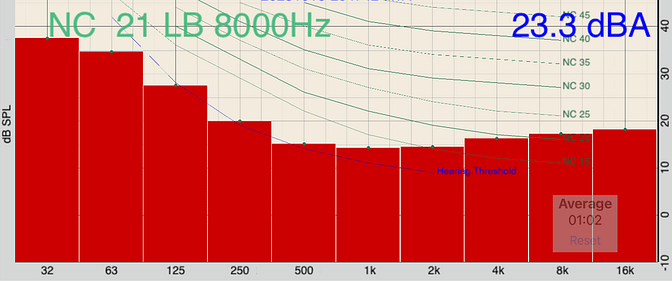Occasionally, I get a client complaining about noises that others (for example, a spouse) cannot hear, or that do not bother others. The client insists that I test the noise level and devise a way of reducing it.
More...
Another type of complaint from a condominium apartment is hearing all kinds of noises, including mechanical room noises, elevator operation, fans, plumbing noises, and noise transfer between units. Is the client oversensitive to noise (hyperacusis)?
To answer the question, we must ask: How much noise is too much?
Determining whether a noise is “too much” involves more than simply measuring sound levels. Objectively, noise levels can be compared against recognized standards, such as ASHRAE, WHO guidelines, or municipal acoustic criteria for dwellings. If measured levels are below these limits, the environment is considered acoustically acceptable. However, perception of noise is subjective — certain sounds, particularly those that are tonal, intermittent, or low-frequency, may be noticeable or irritating even at low levels. Individual sensitivity, expectation, and the psychological context also play essential roles in how a sound is experienced. Therefore, when assessing noise concerns, it is necessary to consider both objective measurements and occupants' subjective responses. My goal is to ensure not only compliance with standards but also comfort and peace of mind for all residents.
Noise level criteria
ASHRAE recommends a maximum noise level in a bedroom of 35 dBA or NC 30. WHO recommends a maximum noise level of 30 dBA in sleeping quarters.
The noise complaint
This is an example from my actual cases. A client residing in a detached house reported hearing a constant buzzing. She had an ENT specialist check her for tinnitus, but she does not have it.
I have proceeded with testing the noise levels.
Noise level test
This is the noise level that I have tested in the client's bedroom:
This chart shows that the sound pressure level averaged over one minute is 23.3 dBA, or NC 21. The red bars show the octave-band frequency spectrum (unweighted).
To put it in context, ASHRAE recommends a maximum noise level in a bedroom of 35 dBA or NC 30. WHO recommends a maximum noise level of 30 dBA in sleeping quarters. The tested noise level is significantly below the recommended limits.
Oversensitivity to sound
Yes — oversensitivity to sound does exist as a recognized medical condition. It is recognized that some individuals experience heightened sensitivity to sound, a condition sometimes referred to in medical literature as hyperacusis or sound sensitivity. This means that sounds which are unobtrusive to most people can still be perceived as disturbing or intolerable by an affected individual.
While I am not a medical professional and cannot offer a clinical opinion, my lay observation is that the client appears oversensitive to normal environmental sounds. From an acoustical standpoint, the measured noise levels in this case are within acceptable limits according to recognized standards; however, the client’s perception of the noise remains significant and warrants understanding and care.
This condition can occur under several related names, depending on the underlying cause or presentation:
Definition: A condition in which everyday sounds (like running water, chewing, or traffic noise) seem painfully loud or overwhelming, even though they’re at a normal volume for others.
Symptoms: Discomfort or pain from ordinary sounds, avoidance of noisy places, emotional distress, tinnitus (ringing in the ears).Phonophobia (sound-related anxiety)
Definition: A condition in which everyday sounds (like running water, chewing, or traffic noise) seem painfully loud or overwhelming, even though they’re at a normal volume for others.
Common in: anxiety disorders, migraine, and sometimes autism spectrum disorder (ASD).
Misophonia
Definition: A strong emotional or physical reaction (anger, disgust, panic) to specific trigger sounds, such as chewing or breathing.
Mechanism: Believed to involve abnormal connections between the auditory and emotional regulation centers in the brain.
Auditory Hypersensitivity in Neurodevelopmental Conditions
This condition is seen in: Autism spectrum disorder (ASD), ADHD and Sensory processing disorder.
My question
As an acoustical consultant, my role is to assess and report on the physical sound environment, not to diagnose or advise on medical or psychological conditions. It is not my place to suggest that a client seek psychiatric or psychological help directly, as that could easily be interpreted as dismissive, judgmental, or beyond my professional scope.
Do you agree? Let me know using the feedback form.

